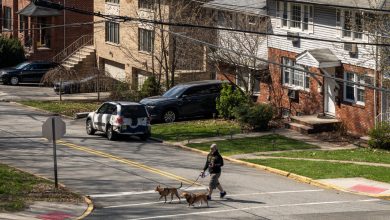Many Schools Aren’t Made for Kids With Learning Differences. The Pandemic Amplified That.

When I think of the parents I’ve interviewed in the past two years, some of the most affected in the early days of the pandemic were those whose children have learning disabilities or differences. Remote school was hard for everyone, but it was particularly difficult for families whose children — 14 percent of all American public school students — needed additional support to learn.
A December 2020 report from the University of Oregon’s Rapid Assessment of Pandemic Impact on Development Early Childhood Project put it bluntly: “Both caregiver and child mental health is suffering in families with a child with special needs, with no signs of improving as the pandemic continues.” As Rachel Harris, a mother in Utah whose 6-year-old son has A.D.H.D. and juvenile arthritis, told me, “In 2020, my mental health was probably the worst it’s ever been.”
Public schools, which are required to provide a “a free appropriate public education” to students with disabilities because of the Individuals with Disabilities Education Act, had a difficult time meeting the needs of those students in that first pandemic year. The nonprofit American Institutes for Research found that in 2020, public schools struggled to support students with disabilities: “Nearly three-quarters (73 percent) of districts reported that it was more or substantially more difficult to provide appropriate instructional accommodations, while over three-quarters (82 percent) said that providing hands-on instructional accommodations and services was more or substantially more difficult.”
Even without the layer of pandemic stress, parents of children with developmental disabilities report higher levels of depression and isolation, and may also face additional financial hurdles because their children require extra care that may be incompatible with working outside the home. They already had to spend a great deal of time, money and effort to get services for their children who don’t fit neatly into an educational system that’s not built for them, and the pandemic “amplified that,” said Lauren Morando Rhim, the co-founder and executive director of the Center for Learner Equity, a national advocacy organization for students with disabilities.
As the majority of students return to some semblance of normal, I decided to check back in with parents of kids with learning differences. I wanted to know how much of an impact they felt remote schooling had on their children’s development and education, and I wanted to know how they were doing, mental health-wise. I also talked to experts to see if there is good data on the bigger picture for students with learning disabilities and differences.
In talking with eight parents and four experts, I discovered that the time spent at home has taken a toll on parents and their kids emotionally. Heather Savatta, of Goshen, N.Y., has a 7-year-old daughter who is “twice-exceptional,” meaning she has learning differences and is also gifted. She said that even though her family is in a better place than they were last year, when her daughter was having extreme behavioral issues in person at the local public school, “we’re now finally realizing how hard it was” — it’s affected her career and, to a lesser degree, her husband’s, she said.
It has also set their children back academically in ways that we don’t even have the data to gauge. There is an “established research base that kids go backward in the summer, and kids with disabilities go back more,” Rhim said. Based on that research, “we should assume that when education is disrupted, their losses will be greater.”
In August, Rhim co-wrote an overview of what she and other experts know so far about how the pandemic affected kids with disabilities, and found that the youngest and oldest students (preschoolers/early grade schoolers and graduating high schoolers) may have been hurt the most by pandemic-related school disruptions.
There is also some evidence that there’s been a lag in getting children with learning disabilities and differences diagnosed. The Individuals with Disabilities Education Act covers early intervention services for infants and toddlers, and according to analysis of data from the Department of Education by the Advocacy Institute, the number of children 2 and under served by the act “declined by 63,847, or 15 percent, from 2019 and the percent of population served fell from 3.7 percent to 3.2 percent.” This decline, the Advocacy Institute said, is “quite troubling” and might be because so many young children missed their pediatric well visits in 2020 — that’s where unmet milestones are often recognized for children under 2.
This would jibe with what I heard from parents of school-age children, many of whom felt that there was a delay in getting their child the appropriate diagnosis and supports. Katherine Bell, who has two daughters with learning disabilities, said that she thinks her older daughter’s dyslexia diagnosis was delayed by remote learning. Her daughter is 11, and because she was compensating so well, her learning disorder went under the radar at her New York City public school until this year. “Being remote slowed down the process of being diagnosed,” Bell said, “and slowed her down emotionally and socially in a way that’s really hard to rectify.”
Other parents said that support services for their children were harder to obtain, as providers are scarcer than they were before the pandemic. Tracy Brisson, who lives in Atlanta, has a son in kindergarten who has auditory and sensory processing disorders. The audiologist she was able to find during the pandemic who specializes in her son’s disorders is a 45-minute drive away, so she has to cut her work hours twice a week to be able to take him to his appointments.
The picture isn’t all bleak, however. Frank Urso, who has two children with autism who are 6 and 7, said that since his daughter and son have been back at in-person public school in Plainfield, Ill., they have been thriving. His son in particular, Urso said: “Like a rubber band, he snapped back, his speech, his math skills, really doing well since he’s been in school.”
But even for parents whose kids are doing well, or at least better, now, there is a worry that was not there before the pandemic, said Lisa Halfhill, from Spokane, Wash., who has a 6-year-old daughter who has Tourette syndrome. Everything feels precarious, as if the carefully constructed routines and support systems for families whose kids have special needs can fall apart at any moment.
When I spoke to Halfhill last Thursday she said the coronavirus infection rate had declined enough in her area that the next day was her daughter’s last having to wear a mask in school. “There’s just that fear there, of are we pulling the plug on this too early?” she said. “Are things going to go back to hellish conditions?”
“And the fear and the guilt of thinking about our kids going through that isolation again — the loss of the routine, that would be so devastating,” she added, “for our whole family.”
More on the Pandemic and Education
-
American children are “severely behind in reading,” according to reporting from Dana Goldstein. “Children in every demographic group have been affected, but Black and Hispanic children, as well as those from low-income families, those with disabilities and those who are not fluent in English, have fallen the furthest behind.”
-
In 2020, Nikita Stewart talked to parents of children with disabilities who “face an agonizing choice: working outside the home or caring for their children. Either option can spiral a family into poverty or keep them there. Choosing both at the same time can leave some parents feeling as if they are doing neither well.”
-
The special education system was not working all that wonderfully before the pandemic in many places. In 2018, Elizabeth A. Harris looked at the system that serves the “200,000 students in New York City public schools classified as having a disability, which can be anything from mild dyslexia to a complex physical disorder. These students are a small city unto themselves, and the special education system that serves them is awash in delays, misinformation and confusion.”
Tiny Victories
Parenting can be a grind. Let’s celebrate the tiny victories.
If you want a chance to get your Tiny Victory published, find us on Instagram @NYTparenting and use the hashtag #tinyvictories; email us; or enter your Tiny Victory at the bottom of this page. Include your full name and location. Tiny Victories may be edited for clarity and style. Your name, location and comments may be published, but your contact information will not. By submitting to us, you agree that you have read, understand and accept the Reader Submission Terms in relation to all of the content and other information you send to us.





